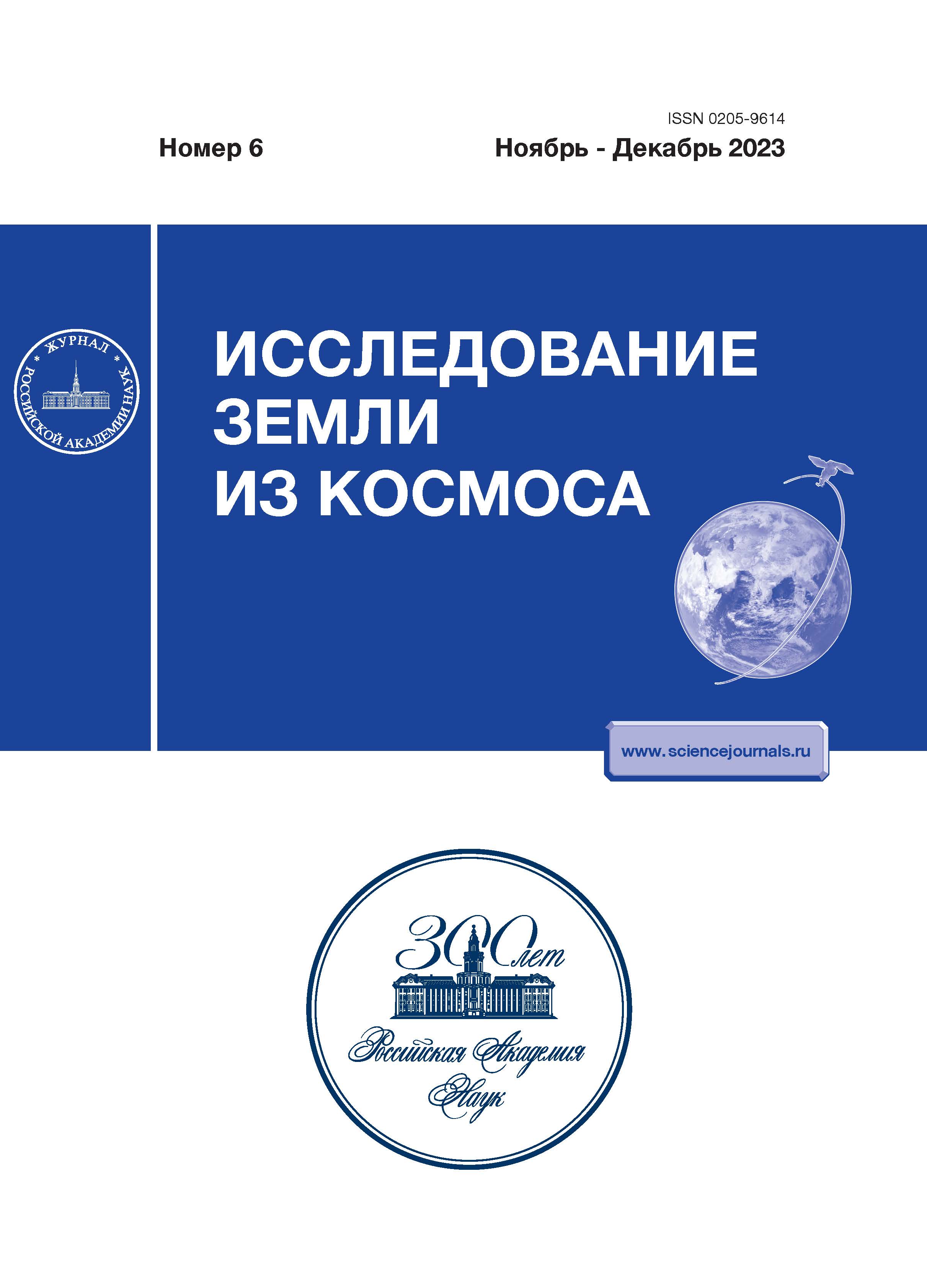Response of the Ionosphere to Strong Tropospheric Disturbances
- Authors: Shalimov S.L.1,2, Zakharov V.I.1,3,4, Solov’eva M.S.1, Bulatova N.R.1,5, Korkina G.M.5, Sigachev P.K.3
-
Affiliations:
- Schmidt Institute of Physics of the Earth, Russian Academy of Sciences (IPP RAS)
- Space Research Institute, Russian Academy of Sciences (IKI RAS)
- Department of Physics, Moscow State University (MSU)
- Obukhov Institute of Atmospheric Physics, Russian Academy of Sciences
- Kamchatka Branch, Unified Geophysical Service of the Russian Academy of Sciences Federal Research Center
- Issue: No 6 (2023)
- Pages: 106-117
- Section: ФИЗИЧЕСКИЕ ОСНОВЫ ИССЛЕДОВАНИЯ ЗЕМЛИ ИЗ КОСМОСА
- URL: https://journals.eco-vector.com/0205-9614/article/view/659173
- DOI: https://doi.org/10.31857/S0205961423060088
- EDN: https://elibrary.ru/DGBRAJ
- ID: 659173
Cite item
Abstract
The response of the lower and upper ionosphere to the passage of several powerful typhoons during 2014–2016 years was studied using regional network of VLF radio stations and measurements of electron density disturbances by satellites of the SWARM mission in the Russian Far East. It was found that the disturbances of the amplitude and phase of the VLF signal, as well as the electron density during the active stage of typhoons, correspond to the passage of atmospheric internal gravity waves and their dissipation. A mechanism for the action of internal gravity waves upon the ionosphere is proposed, which allows to interpret the observed variations in the phase of the VLF signal and variations in the electron density in the upper ionosphere.
About the authors
S. L. Shalimov
Schmidt Institute of Physics of the Earth, Russian Academy of Sciences (IPP RAS); Space Research Institute, Russian Academy of Sciences (IKI RAS)
Author for correspondence.
Email: pmsk7@mail.ru
Russia, Moscow; Russia, Moscow
V. I. Zakharov
Schmidt Institute of Physics of the Earth, Russian Academy of Sciences (IPP RAS); Department of Physics, Moscow State University (MSU); Obukhov Institute of Atmospheric Physics, Russian Academy of Sciences
Email: pmsk7@mail.ru
Russia, Moscow; Russia, Moscow; Russia, Moscow
M. S. Solov’eva
Schmidt Institute of Physics of the Earth, Russian Academy of Sciences (IPP RAS)
Email: pmsk7@mail.ru
Russia, Moscow
N. R. Bulatova
Schmidt Institute of Physics of the Earth, Russian Academy of Sciences (IPP RAS); Kamchatka Branch, Unified Geophysical Service of the Russian Academy of Sciences Federal Research Center
Email: pmsk7@mail.ru
Russia, Moscow; Russia, Petropavlovsk-Kamchatsky
G. M. Korkina
Kamchatka Branch, Unified Geophysical Service of the Russian Academy of Sciences Federal Research Center
Email: pmsk7@mail.ru
Russia, Petropavlovsk-Kamchatsky
P. K. Sigachev
Department of Physics, Moscow State University (MSU)
Email: pmsk7@mail.ru
Russia, Moscow
References
- Ванина-Дарт Л.Б., Покровская И.В., Шарков Е.А. Реакция нижней экваториальной ионосферы на сильные тропические возмущения // Геомагнетизм и аэрономия. 2008. Т. 48. № 2. С. 255–260.
- Ванина-Дарт Л.Б., Шарков Е.А. Основные результаты современных исследований физических механизмов взаимодействия тропических циклонов и ионосферы // Исслед. Земли из космоса. 2016. № 3. С. 75–83.
- Данилов А.Д., Власов М.Н. Фотохимия ионизованных и возбужденных частиц в нижней ионосфере. Л.: Гидрометеоиздат, 1973. 191 с.
- Данилов А.Д., Казимировский Э.С., Вергасова Г.В., Хачикян Г.Я. Метеорологические эффекты в ионосфере. Л.: Гидрометеоиздат. 1987. 267 с.
- Захаров В.И., Куницын В.Е. Региональные особенности атмосферных проявлений тропических циклонов по данным наземных GPS-cетей // Геомагнетизм и Аэрономия. 2012. Т. 52. № 4. С. 562–574.
- Захаров В.И., Пилипенко В.А., Грушин В.А., Хамидуллин А.Ф. Влияние тайфуна VONG-FONG 2014 на ионосферу и геомагнитное поле по данным спутников SWARM: 1. Волновые возмущения ионосферной плазмы // Солнечно-земная физика. 2019. Т. 5. № 2. С. 114–123. https://doi.org/10.12737/szf-52201914
- Пахомов С.В., Князев А.К. Озон в мезосфере и электронная концентрация среднеширотной области D // Геомагнетизм и аэрономия. 1988. Т. 28. № 6. С. 976–979.
- Чемберлен Дж. Теория планетных атмосфер. М.: Мир. 1981. 352 с.
- Шалимов С.Л. Атмосферные волны в плазме ионосферы. М.: ИФЗ РАН, 2018. 390 с.
- Шалимов С.Л., Соловьева М.С. Отклик ионосферы на прохождение тайфунов по наблюдениям методом СДВ-радиопросвечивания // Солнечно-земная физика. 2022. Т. 8. № 3. https://doi.org/10.12737/szf-81202201
- Ясюкевич Ю.В., Едемский И.К., Перевалова Н.П., Полякова А.С. Отклик ионосферы на гелио- и геофизические возмущающие факторы по данным GPS. Иркутск: ИГУ. 2013. 160 с.
- Forbes J.M., Palo S.E., Zhang X. Variability of the ionosphere // J. Atmos. Sol. Terr. Phys. 2000. V. 62. P. 685–693.
- http://ultramsk.com.
- https://www.jma.go.jp/jma/indexe.html.
- http://directory.eoportal.org/web/eoportal/satellite-missions/s/swarm.
- https://ckp-rf.ru/usu/507436/.
- http://www.gsras.ru/unu/.
- http://www.gsras.ru/new/infres/.
- Kelley M.C. The Earth’s Ionosphere: Plasma Physics & Electrodynamics. N.Y.: Acad. Press, 2009. 550 p.
- Liu Y.M., Wang J.S., Suo Y.-C. Effects of Typhoon on the Ionosphere. Advances in Geosciences. 2006. 29. 351−360. https://doi.org/10.1142/9789812707185_0029
- Mao T., Wang, J., Yang G., Yu T., Ping J., Suo, Y. Effects of typhoon Matsa on ionospheric TEC. Chinese Science Bulletin. 2010. V. 55(8), P. 712–717. https://doi.org/10.1007/s11434-009-0472-0
- Olsen N., Friis-Christensen E., Floberghagen R. et al. The Swarm Satellite Constellation Application and Research Facility (SCARF) and Swarm data products // Earth Planets Space. 2013. V. 65. P. 1189–1200.
- Polyakova A.S., Perevalova N.P. Comparative analysis of TEC disturbances over tropical cyclone zones in the north-west Pacific Ocean, Adv. Space Res. 2013. V. 52. P. 1416–1426, https://doi.org/10.1016 /j.asr.2013.07.029
- Rice D.D., Sojka J.J., Eccles J.V., Schunk R.W. Typhoon Melor and Ionospheric weather in the Asian sector: A case study // Radio Science, 2012. V. 47. P. 1–9. https://doi.org/10.1029/2011RS004917
- Vadas S.L., Fritts D.C. Influence of solar variability on gravity wave structure and dissipation in the thermosphere from tropospheric convection // J. Geophys. Res. 2006. V. 111, A10S12. https://doi.org/10.1029/2005JA011510
Supplementary files


















